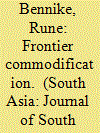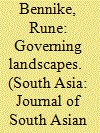| Srl | Item |
| 1 |
ID:
152971


|
|
|
|
|
| Summary/Abstract |
In the contemporary global imagination, Darjeeling typically figures on two accounts: as a unique tourism site replete with colonial heritage and picturesque nature, and as the productive origin for some of the world's most exclusive teas. In this commodified and consumable form, Darjeeling is part of a wide array of frontier places that are increasingly incorporated into the circuits of global capitalism. In the present article, I argue that Darjeeling is in fact an early and emblematic example of such incorporation. By connecting emerging literature on the pre-colonial history of the area with a critical reading of colonial sources, I trace the shifts and erasures that enabled Darjeeling's commodification—a process that involved its transformation from a ‘wild’ Himalayan frontier into a speculative wasteland and, ultimately, into a picturesque and productive ‘summer place’. Reading through a range of material and representational interventions, I uncover the particular assemblage of government and capital that enabled this transformation and highlight its potential resonances with contemporary cases of frontier commodification in South Asia and beyond.
|
|
|
|
|
|
|
|
|
|
|
|
|
|
|
|
| 2 |
ID:
152968


|
|
|
|
|
| Summary/Abstract |
Throughout most of human history, the topological features of landscapes have played a crucial role in the government of people and places. The hostile geographies of mountains and forests have provided zones of refuge for people fleeing expanding empires and state structures. In turn, ecological features have been employed as central markers in governmental discourse separating civilisation from the inhospitable wilderness beyond.11. Sumit Guha, Environment and Ethnicity in India, 1200–1991 (Cambridge: Cambridge University Press, 1999); and James
|
|
|
|
|
|
|
|
|
|
|
|
|
|
|
|